Mentoring is a new concept for many organizations in the Philippines. Research is still scarce, and examples of successful mentoring programs can be tough to find. UA&P, however, has long practiced mentoring—in fact, from the very beginning. A trailblazer in promoting mentoring culture, UA&P has always given mentoring a pivotal role in the holistic education it offers. Students and employees alike are helped to integrate life experiences through regular, confidential, purposeful chats.
As the only university in Southeast Asia to provide individual mentors to all of its students and employees, UA&P embraces its leadership role in mentoring in the region by organizing, through its Center for Student Affairs, the 1st International Mentoring Conference (IMeC) from July 19 to 21. Attended by more than 200 delegates from various sectors—from schools to corporations—and from countries such as China, Indonesia, Malaysia, and the United States, the conference in UA&P has sparked the mentoring conversation.
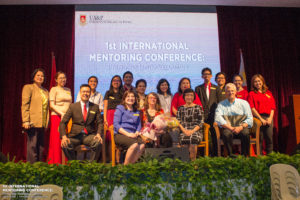
Three keynote speakers, all experts in some aspects of mentoring, delivered insightful lectures during the conference. Dr. W. Brad Johnson, professor at the United States Naval Academy and a faculty associate at the Graduate School of Education at Johns Hopkins University, imparted his research on the key ingredients in building a strong mentoring culture and expertly conducted a workshop on how to become a Master mentor. Ms. Ann Rolfe, founder of Mentoring Works Australia, emphasized the key factors to successful mentoring and the fatal flaws in mentoring programs. She shared practical tips, tools, and techniques to set up the right mentoring dynamics for institutions and organizations. She generously offered to the participants continuing training through webinars. Dr. Jean Rhodes, Director of the Center for Evidence-Based Mentoring at the University of Massachusetts, provided through a video presentation an overview of the three decades of researches on the effectiveness of youth mentoring programs.
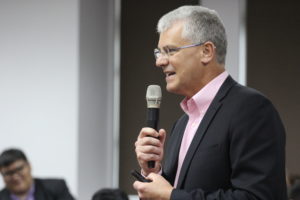
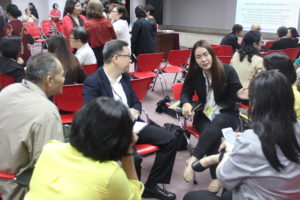
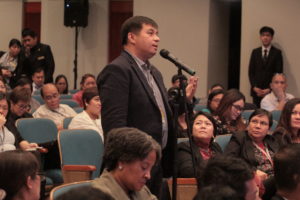
Monica Bongco, a participant from Bacolod, comments, “IMeC has helped me see mentoring as a very good tool to form individuals towards improving themselves emotionally, professionally and socially. The keynote speakers effectively conveyed the power of affirmation, the effectiveness of listening, the importance of living integrity so as to be role models to our mentees and, the need to develop, as well as master, the mentoring skills in order to be effective.”
The conference was also a hub for sharing the best practices in mentoring, albeit mostly for a school setting, as 18 papers were presented by local and foreign participants. “I was struck to realize that the interest in mentoring has spread to so many educational institutions and organizations in the country, and that the mentoring practice is growing deep roots because it is research-based,” explains Trinky Marcelo from PAREF Rosehill School, who was among those who presented a paper in the conference.
To further enrich the discussions, Dr. Severina Villegas and Dr. Gabby Dy-Liacco of UA&P shared engaging stories on “how to journey with the mentees along an inclined plane.” They synthesized the learning gained by the delegates from the previous sessions.
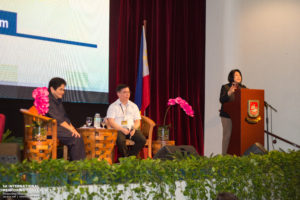
Dr. Arwin Vibar, adjunct Professor at the Widya Mandala Catholic University in Surabaya, Indonesia remarked, “IMeC was a good opportunity to validate the mentoring theory and practice that I learned from and through UA&P as I helped in mentoring junior officers, instructors, and administrative personnel. It feels good to know that the mentoring we do at UA&P isn’t simply practiced in our institution, but is actually being done in other countries as well, particularly in those where the keynote speakers come from. I find the new insights gathered from IMeC very useful especially now that I’m in charge of mentoring International Business Management students.”
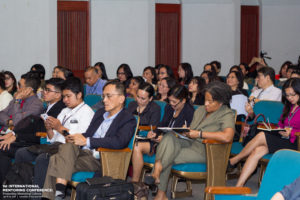
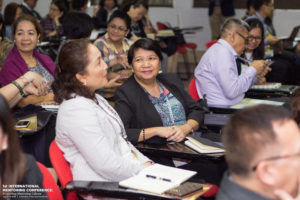
Fired up by all the learning experiences and networking, the participants of the 1st International Mentoring Conference proposed the creation of an association of mentors in the Philippines. Dr. Ces Resurreccion, the conference chair, concludes, “The real measure of the success of this conference lies on how it will affect all of us in UA&P in our pioneering efforts on mentoring. After which, we can look into how it creates a ripple effect on our participants, or, more precisely, what concrete actions these mentors will take after they leave UA&P. We look forward to further building partnerships with them and their organizations.”
“So much more can be accomplished if we work together to be able to provide mentoring (and good mentoring at that) to those most in need,” seconds a participant. “It was a very inspiring conference!” #
Mentoring, the UA&P Way
Here’s what some UA&P mentees say of mentoring:
“If I were to describe mentoring in a metaphor, my mentors and their advice are the sturdy ropes that adjust the direction of my sail, so I might travel a better route and let the seasons of life take me along its course. They serve as the rudders that steer me forward when I am at a standstill; with the wisdom of their experience and their magnanimity to listen, to mind, I am propelled.”
- Rafaella Mikayla Villarosa, School of Law and Governance
“Mentoring has definitely allowed me to understand myself better. It took an effort at the start because I had to become comfortable with my mentor, but her willingness to listen and the time she spent to help me come up with resolutions each meeting was what made it worth it.”
- Erika Hautea, School of Management
“Mentoring can be fruitful especially when the mentor challenges a mentee’s well-guarded and comfortable perspectives about life. I strongly believe that people can improve through mentoring when mentees realize that they should change how they think and act in order to accomplish what is best within their respective situations. This is possible because the mentor has already been refined by numerous experiences that a mentee has not lived through yet.”
- Rafael Arri Morales, College of Arts and Sciences alumnus
“Casual conversations with my mentor definitely helped me feel and know that she is my friend. But going beyond this friendly atmosphere, her unique role and perspective as a mentor helps me accept honest criticisms and evaluate my decisions reasonably both in the personal and professional aspects. This level of trust we give each other is what makes my experiences with her always positive.”
- Mary Grace Cruz, School of Communication
“The mentoring program of the University really helped me to value the importance of listening. From the chats that I’ve received, my eyes were opened to all the positive learnings I could get from a tough situation. Furthermore, my mentor inspired and encouraged me to always have a listening heart as I deal with other people. Truly, listening may be something simple, but it sure does count.”
- Ray Alexander Santiago, School of Communication
“My mentor is like a flashlight in the dark; she is literally my shining guide especially at times when it’s difficult to figure things out on my own. Her readiness to listen, wise advice, and ability to empathize are some of the traits that I truly appreciate about her. I survived difficult moments with my sanity intact because she was by my side every step of the way.”
- Hazel Anne Pergamino, School of Law and Governance
“Mentoring helped me a lot not only in adapting to a new environment (college) but also in terms of academics, spiritual formation, and decision making. I always consult my mentor when I have to make big decisions, and what I like about it is that she guides me in weighing the pros and cons, and at the end of the day, I make the final decision.”
- Maika Jessica Carolino, School of Sciences and Engineering
“Mentoring has become an important part of my experience in the University because I was able to get good advice from my mentor about the different aspects of life, especially in my studies and my spiritual life. Attending mentoring sessions helped me get through my challenges in my first year, and I am glad that my mentor was very supportive when I needed help.”
- Maria Andrea Benitez, 6YP Year 2
Good job. We are trying to organise for a similar conference in Africa at Strathmore University. Kindly connect me to any of the organiser as we would like to borrow some ideas on how to organise and run the conference. Good job and right direction in Mentoring. Thankyou for setting the pace